Monday Feb 16, 2026
Monday Feb 16, 2026
Monday, 7 December 2020 00:00 - - {{hitsCtrl.values.hits}}
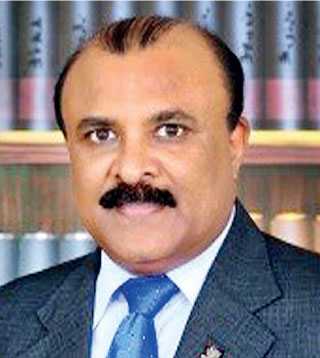 |
| Moderator G.S. Sylvester |
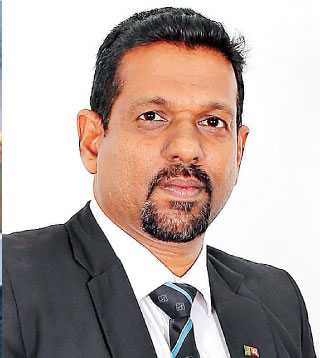 |
| Roshan Fernando |
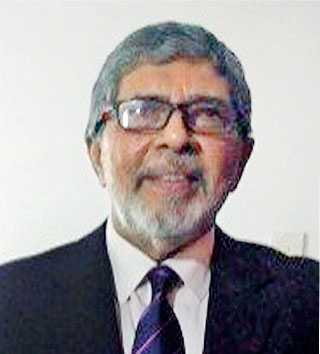 |
| Fayaz Saleem |
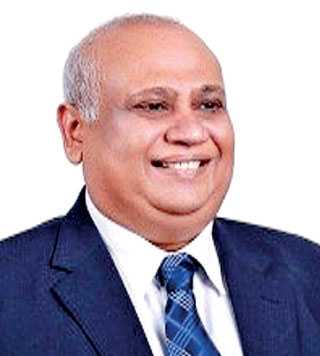 |
| Jude Joseph |
 |
| Thilanka Abeywardena |
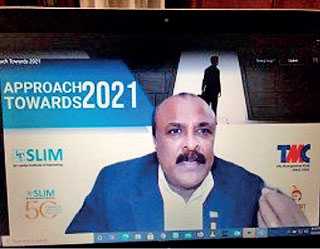 |
| G.S. Sylvester – Moderator |
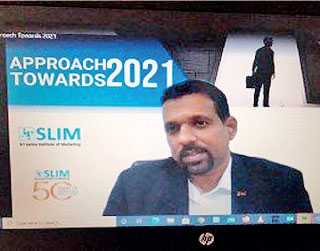 |
| Roshan Fernando |
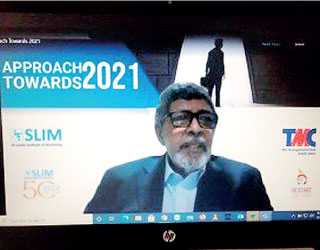 |
| Fayaz Saleem |
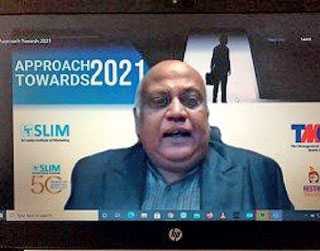 |
| Jude Joseph |
 |
| Thilanka Abeywardena |
A joint webinar was organised by Sri Lanka Institute of Marketing (SLIM) and The Management Club (TMC) Colombo on the topic ‘Approach Towards 2021’ on Wednesday 2 December at 6 p.m. The panel of speakers and the topics presented are as follows:
Sri Lanka Institute of Marketing President and Derana/Power House Ltd. General Manager
Roshan Fernando made a brief presentation on the topic – ‘Re Start Sri Lanka’ – an initiative of the Sri Lanka Institute of Marketing in conjunction with the Prime Minister’s office to ensure Sri Lanka emerges stronger and back on track as soon as possible.
The Management Club Founder President Emeritus and Mankind International Ltd. Chairman, Principal Consultant Fayaz Saleem made a brief presentation on – ‘The Impact Pandemic will have on employment and the corporate sector’.
Leyden Group of Companies Managing Director Jude Joseph made a brief presentation on – ‘The Future of Entrepreneurship in the New Normal’.
Sri Lanka Institute of Marketing Vice President and Microsoft Sri Lanka Ltd. South East Asia New Markets CMO Lead Thilanka Abeywardena made a brief presentation on – ‘Serving Consumers in the digital world’.
The webinar was moderated by Marketing Consultant, Trainer and Lecturer G.S. Sylvester.
The moderator Sylvester welcomed all participants and made an initial briefing with regard to the objectives of the webinar ‘Approach towards 2021’. He highlighted that smart business leaders realise that now is the time to seize the opportunity to develop a business plan for 2021 because COVID-19 has not only exposed the strengths and weaknesses of many companies, but it has also opened new avenues for conducting business. To help determine the current state of affairs, business leaders should conduct a thorough analysis of the company to help devise a long-term plan for 2021. In order to survive and thrive how should business leaders plan for 2021 was the main focus of this webinar.
Roshan Fernando briefed the participants of the SLIM’s initiative ‘Restart Sri Lanka’ (RSL). He said in order to survive the ravages of the deadly COVID-19 outbreak, all have to Regroup, Rebuild and Restructure our lives and businesses in new and unforeseen ways. While we prepare to face the challenges of the immediate future, he said one thing is clear, we cannot do this alone. We need to support one another and stand by each other, fired up by the spirit of resilience we Sri Lankans are reputed for. He requested all Sri Lankans; employers and employees, every single person who has the power to fuel our country’s economy to get involved in this initiative. He further elaborated on the six key objectives of Restart Sri Lanka.
In concluding his presentation, Fernando invited all Sri Lankan businesses including SMEs, to harness the support extended through ‘Restart Sri Lanka’ in discovering the ‘new normal’ and devising winning strategies to prosper and concluded saying – Let’s congregate and win the ‘new world’ together.
Fayaz Saleem addressed on the topic – ‘The impact pandemic will have on employment and the corporate sector’. Saleem commenced his presentation by first thanking the former President of SLIM and current Chairman of TMC Colombo Dr. Pradeep Edward for having initiated move to have this joint presentation.
Saleem then went on to his topic, and first analysed where we were from April to about July, briefly spoke of the lockdowns, curfews, and work from home arrangements. He spoke about the reduction in salaries, benefits even the reduction in headcount in many organisations. He stated that, many of the employees in the SME sectors were made redundant, and corporates managed to keep themselves afloat due to the Government-arranged Saubagya Loans. However, he said that unemployment increased, and corporates had top and bottom line reduced. He further spoke of the current yet similar situation, of lockdowns, intermittent curfew across parts of the country, and restrictions on local travel. Employees he said continued to work from home. All this compelled the corporates to keep costs low, and instituted a freeze on recruitment.
Saleem was deeply concerned that over 30% of the SME sector had to close operations, whilst larger corporates continued to reduce headcount, resulting in further unemployment. Going forward he predicts, a small shift from permanent to contractual employment, combining of roles, multitasking, and the focus on IT and digital transformation. Introduction of performance driven pay and Non-Executive Directors to play a wider executive role may also be envisaged. Saleem expressed his concern about the possible change in culture of organisations, many whom preserved with pride he exclaimed. He said senior management may need to exert a greater policy of employee engagement to continue to maintain their culture.
Jude Joseph made a presentation on – ‘The Future of Entrepreneurship in the New Normal’. He briefed on two key important areas – the first – entrepreneurial mindset where he highlighted how do we add value to an organisation, can we measure our performances, embrace change in their planning and cut our excess baggage. Secondly to reconcile the organisation culture with digital transformation. He highlighted that technology will play a central role in this new normal, which will change definitions of the workplace, both remotely and on the job site. To prepare for the new normal, he highlighted companies should redirect investments from bigger office spaces and on-site support to new technological solutions to allow for resilient, safe, and productive work environments. He also addressed about how to incorporate zero-based budgeting strategies, the use of Artificial Intelligence and Machine Learning in business decision making.
The last presentation was delivered by Thilanka Abeywardena on the topic – “Serving consumers in the ‘digital world’”. She highlighted the impact of COVID-19 on businesses of all shapes and sizes around the world has caused a seismic shift in how we conduct our work. As we fight to contain the pandemic, we’ve hit the fast forward button on many technologies that were already in place. From remote working to digital events and virtual reality training facilities, these technologies have now become an essential part of our day-to-day work life and are here to stay.
She highlighted on how COVID-19 is changing consumer behaviour in at least six important ways such as: Shopping: Catching up to the great digital migration, E-services: New ‘service platforms’ to help consumers take care of business, Home: Finding a spot in the new ‘command central’ for all activities, Community: Localising the experiences, Trust: Creating a space for health and affordability, Purpose: Holding brands to higher standards and transforming companies and new leadership.
She also presented two findings of a Microsoft-IDC study regarding the Culture of Innovation, Foundation for business resilience and economic recovery in Asia Pacific, 2020.
She also briefed as per to the Microsoft-IDC new study, Culture of Innovation, Foundation for business resilience and economic recovery in Asia Pacific, 2020 it was revealed: One in three leaders expect to increase their market share despite the pandemic and 45% of leaders believe that their organisations will recover from the COVID-19 crisis in six months or less.
She stressed that companies in all business sectors need to embrace this change as they look forward to 2021. They’ll have to rethink their structure and strategy altogether, as the new normal means everyone being digital, everywhere, always. This has vast consequences for the way businesses talk to their customers, and also on the way they invent, produce and distribute their products.
In conclusion Sylvester mentioned as the COVID-19 pandemic continues to evolve, there has never been a more pressing need for organisations to rethink re-invent and reconfigure their businesses to remain relevant in the new normal. Organisations are facing unprecedented times as the measures being deployed to slow the spread of the novel coronavirus (COVID-19) are impacting capital markets, supply chains, and business operations. The uncertainties of the current environment serve as a powerful reminder to senior decision-makers of the need for risk management, employee engagement, customer engagement and crisis planning. Marketers shouldn’t wait for problems to develop and concluded by stating, “Innovation is no longer an option, but essential to survival and success.”
In conclusion, he thanked all the four presenters for their great insights and thanked SLIM and TMC for jointly organising this webinar and also thanked Past President SLIM and current Chairman TMC Colombo Chapter Dr. Pradeep Edward for initiating this webinar.